1、简介、环境搭建
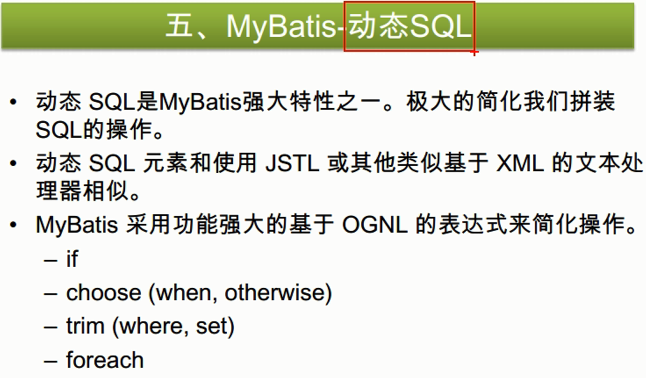
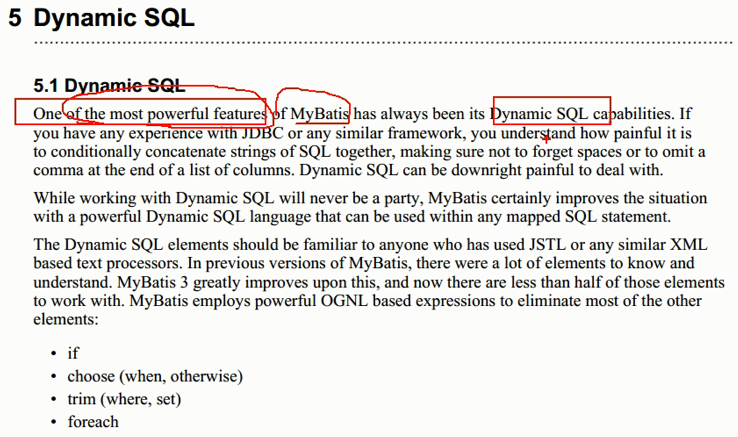
2、if判断&ONGL
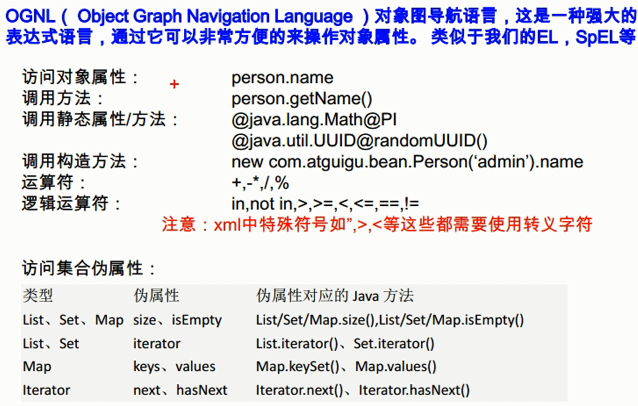
<!-- 查询员工,要求,携带了哪个字段查询条件就带上这个字段的值 -->
<!-- public List<Employee> getEmpsByConditionIf(Employee employee); -->
<select id="getEmpsByConditionIf" resultType="com.atguigu.mybatis.bean.Employee">
select * from tbl_employee
<!-- where -->
<where>
<!-- test:判断表达式(OGNL)
OGNL参照PPT或者官方文档。
c:if test
从参数中取值进行判断
遇见特殊符号应该去写转义字符:
&&:
-->
<if test="id!=null">
id=#{id}
</if>
<if test="lastName!=null && lastName!=""">
and last_name like #{lastName}
</if>
<if test="email!=null and email.trim()!=""">
and email=#{email}
</if>
<!-- ognl会进行字符串与数字的转换判断 "0"==0 -->
<if test="gender==0 or gender==1">
and gender=#{gender}
</if>
</where>
</select>
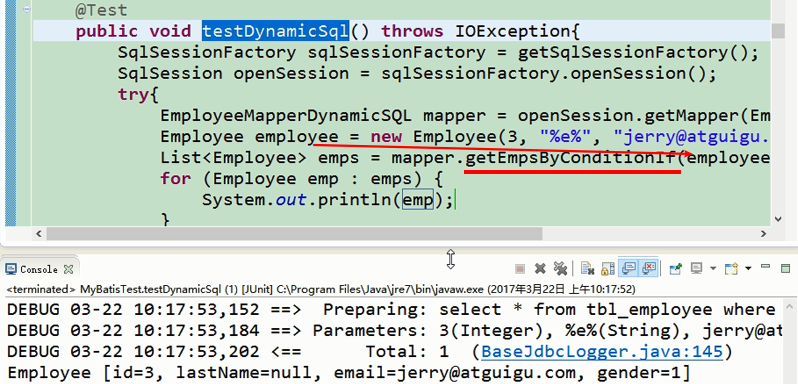
3、where查询条件
如果第一个查询条件为空,第一个and就会报错,这是的处理解决方案
方案1:加上where 1=1
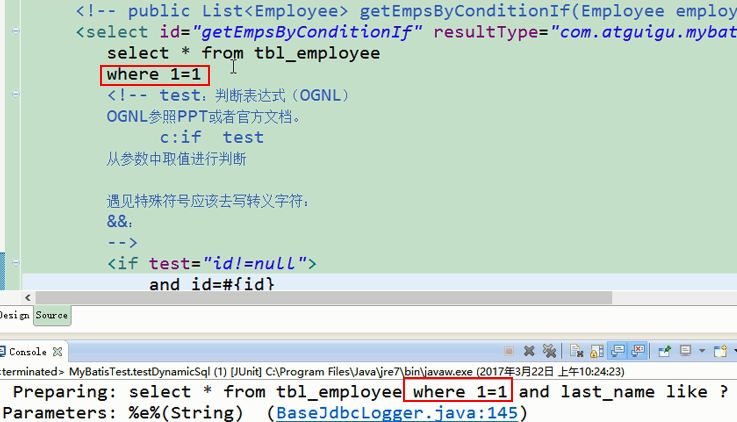
方案2:mybatis推荐的where标签
<select id="getEmpsByConditionIf" resultType="com.atguigu.mybatis.bean.Employee">
select * from tbl_employee
<!-- where -->
<where>
<!-- test:判断表达式(OGNL)
OGNL参照PPT或者官方文档。
c:if test
从参数中取值进行判断
遇见特殊符号应该去写转义字符:
&&:
-->
<if test="id!=null">
id=#{id}
</if>
<if test="lastName!=null && lastName!=""">
and last_name like #{lastName}
</if>
<if test="email!=null and email.trim()!=""">
and email=#{email}
</if>
<!-- ognl会进行字符串与数字的转换判断 "0"==0 -->
<if test="gender==0 or gender==1">
and gender=#{gender}
</if>
</where>
</select>
//查询的时候如果某些条件没带可能sql拼装会有问题
//1、给where后面加上1=1,以后的条件都and xxx.
//2、mybatis使用where标签来将所有的查询条件包括在内。mybatis就会将where标签中拼装的sql,多出来的and或者or去掉
//where只会去掉第一个多出来的and或者or。
所以用where的话一定要把and放在前面
变换一下形式,where只会去掉第一个多出来的and或者or。这样还会出问题
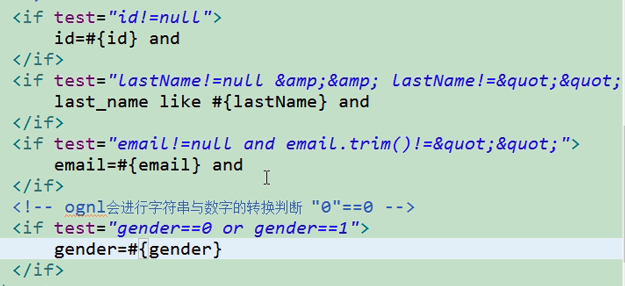
4、Trim标签
<!--public List<Employee> getEmpsByConditionTrim(Employee employee); -->
<select id="getEmpsByConditionTrim" resultType="com.atguigu.mybatis.bean.Employee">
select * from tbl_employee
<!-- 后面多出的and或者or where标签不能解决
prefix="":前缀:trim标签体中是整个字符串拼串 后的结果。
prefix给拼串后的整个字符串加一个前缀
prefixOverrides="":
前缀覆盖: 去掉整个字符串前面多余的字符
suffix="":后缀
suffix给拼串后的整个字符串加一个后缀
suffixOverrides=""
后缀覆盖:去掉整个字符串后面多余的字符
-->
<!-- 自定义字符串的截取规则 -->
<trim prefix="where" suffixOverrides="and">
<if test="id!=null">
id=#{id} and
</if>
<if test="lastName!=null && lastName!=""">
last_name like #{lastName} and
</if>
<if test="email!=null and email.trim()!=""">
email=#{email} and
</if>
<!-- ognl会进行字符串与数字的转换判断 "0"==0 -->
<if test="gender==0 or gender==1">
gender=#{gender}
</if>
</trim>
</select>
5、choose(when,otherwise)分支标签
• choose (when, otherwise):分支选择;带了break的swtich-case
如果带了id就用id查,如果带了lastName就用lastName查;只会进入其中一个
<!-- public List<Employee> getEmpsByConditionChoose(Employee employee); -->
<select id="getEmpsByConditionChoose" resultType="com.atguigu.mybatis.bean.Employee">
select * from tbl_employee
<where>
<!-- 如果带了id就用id查,如果带了lastName就用lastName查;只会进入其中一个 -->
<choose>
<when test="id!=null">
id=#{id}
</when>
<when test="lastName!=null">
last_name like #{lastName}
</when>
<when test="email!=null">
email = #{email}
</when>
<otherwise>
gender = 0
</otherwise>
</choose>
</where>
</select>
6、set与if结合
<!--public void updateEmp(Employee employee); -->
<update id="updateEmp">
<!-- Set标签的使用:逗号有可能多 -->
update tbl_employee
<set>
<if test="lastName!=null">
last_name=#{lastName},
</if>
<if test="email!=null">
email=#{email},
</if>
<if test="gender!=null">
gender=#{gender}
</if>
</set>
where id=#{id}
<!--
Trim:更新拼串
update tbl_employee
<trim prefix="set" suffixOverrides=",">
<if test="lastName!=null">
last_name=#{lastName},
</if>
<if test="email!=null">
email=#{email},
</if>
<if test="gender!=null">
gender=#{gender}
</if>
</trim>
where id=#{id} -->
</update>
7、foreach遍历集合

<!--public List<Employee> getEmpsByConditionForeach(List<Integer> ids); -->
<select id="getEmpsByConditionForeach" resultType="com.atguigu.mybatis.bean.Employee">
select * from tbl_employee
<!--
collection:指定要遍历的集合:
list类型的参数会特殊处理封装在map中,map的key就叫list
item:将当前遍历出的元素赋值给指定的变量
separator:每个元素之间的分隔符
open:遍历出所有结果拼接一个开始的字符
close:遍历出所有结果拼接一个结束的字符
index:索引。遍历list的时候是index就是索引,item就是当前值
遍历map的时候index表示的就是map的key,item就是map的值
#{变量名}就能取出变量的值也就是当前遍历出的元素
-->
<foreach collection="ids" item="item_id" separator=","
open="where id in(" close=")">
#{item_id}
</foreach>
</select>
8、foreach批量插入








<!-- 批量保存 -->
<!--public void addEmps(@Param("emps")List<Employee> emps); -->
<!--MySQL下批量保存:可以foreach遍历 mysql支持values(),(),()语法-->
<insert id="addEmps">
insert into tbl_employee(
<include refid="insertColumn"></include>
)
values
<foreach collection="emps" item="emp" separator=",">
(#{emp.lastName},#{emp.email},#{emp.gender},#{emp.dept.id})
</foreach>
</insert><!-- -->
<!-- 这种方式需要数据库连接属性allowMultiQueries=true;
这种分号分隔多个sql可以用于其他的批量操作(删除,修改) -->
<!-- <insert id="addEmps">
<foreach collection="emps" item="emp" separator=";">
insert into tbl_employee(last_name,email,gender,d_id)
values(#{emp.lastName},#{emp.email},#{emp.gender},#{emp.dept.id})
</foreach>
</insert> -->
9、oracel批量插入、保存
<!-- Oracle数据库批量保存:
Oracle不支持values(),(),()
Oracle支持的批量方式
1、多个insert放在begin - end里面
begin
insert into employees(employee_id,last_name,email)
values(employees_seq.nextval,'test_001','test_001@atguigu.com');
insert into employees(employee_id,last_name,email)
values(employees_seq.nextval,'test_002','test_002@atguigu.com');
end;
2、利用中间表:
insert into employees(employee_id,last_name,email)
select employees_seq.nextval,lastName,email from(
select 'test_a_01' lastName,'test_a_e01' email from dual
union
select 'test_a_02' lastName,'test_a_e02' email from dual
union
select 'test_a_03' lastName,'test_a_e03' email from dual
)
-->
<insert id="addEmps" databaseId="oracle">
<!-- oracle第一种批量方式 -->
<!-- <foreach collection="emps" item="emp" open="begin" close="end;">
insert into employees(employee_id,last_name,email)
values(employees_seq.nextval,#{emp.lastName},#{emp.email});
</foreach> -->
<!-- oracle第二种批量方式 -->
insert into employees(
<!-- 引用外部定义的sql -->
<include refid="insertColumn">
<property name="testColomn" value="abc"/>
</include>
)
<foreach collection="emps" item="emp" separator="union"
open="select employees_seq.nextval,lastName,email from("
close=")">
select #{emp.lastName} lastName,#{emp.email} email from dual
</foreach>
</insert>
10、内置参数 parameter&databaseid &bind绑定
<!-- 两个内置参数:
不只是方法传递过来的参数可以被用来判断,取值。。。
mybatis默认还有两个内置参数:
_parameter:代表整个参数
单个参数:_parameter就是这个参数
多个参数:参数会被封装为一个map;_parameter就是代表这个map
_databaseId:如果配置了databaseIdProvider标签。
_databaseId就是代表当前数据库的别名oracle
-->
<!--public List<Employee> getEmpsTestInnerParameter(Employee employee); -->
<select id="getEmpsTestInnerParameter" resultType="com.atguigu.mybatis.bean.Employee">
<!-- bind:可以将OGNL表达式的值绑定到一个变量中,方便后来引用这个变量的值 -->
<bind name="_lastName" value="'%'+lastName+'%'"/>
<if test="_databaseId=='mysql'">
select * from tbl_employee
<if test="_parameter!=null">
where last_name like #{lastName}
</if>
</if>
<if test="_databaseId=='oracle'">
select * from employees
<if test="_parameter!=null">
where last_name like #{_parameter.lastName}
</if>
</if>
</select>
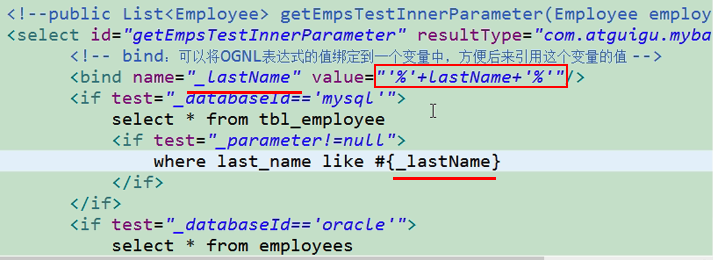
推荐传递,不推荐bind


11、抽取可重用sql片段
<!--
抽取可重用的sql片段。方便后面引用
1、sql抽取:经常将要查询的列名,或者插入用的列名抽取出来方便引用
2、include来引用已经抽取的sql:
3、include还可以自定义一些property,sql标签内部就能使用自定义的属性
include-property:取值的正确方式${prop},
#{不能使用这种方式}
-->
<sql id="insertColumn">
<if test="_databaseId=='oracle'">
employee_id,last_name,email
</if>
<if test="_databaseId=='mysql'">
last_name,email,gender,d_id
</if>
</sql>


